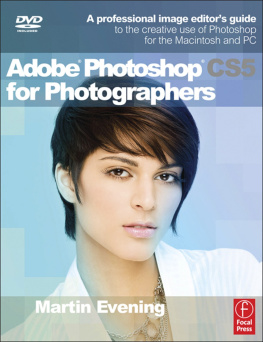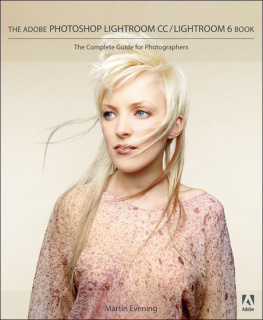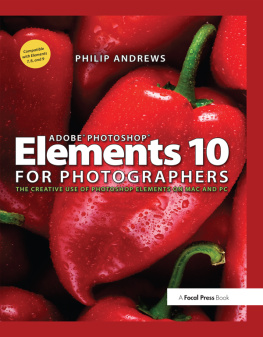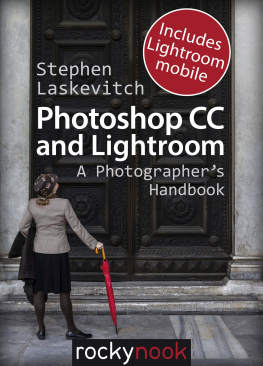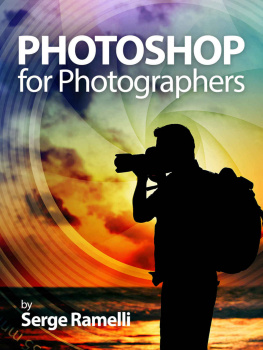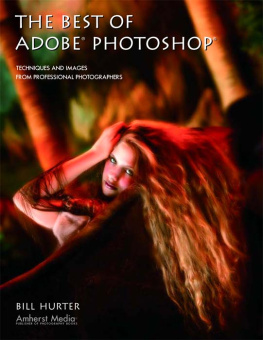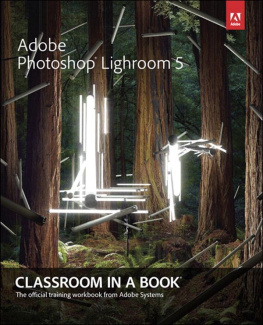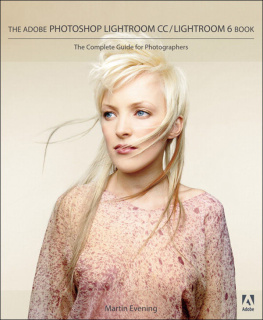Copyright
Focal Press is an imprint of Elsevier
The Boulevard, Langford Lane, Kidlington, Oxford, OX5 1GB, UK
30 Corporate Drive, Suite 400, Burlington, MA 01803, USA
First published 2010
Copyright 2010, Martin Evening. Published by Elsevier Ltd. All rights reserved.
The right of Martin Evening to be identified as the author of this work has been asserted in accordance with the Copyright, Designs and Patents Act 1988
No part of this publication may be reproduced or transmitted in any form or by any means, electronic or mechanical, including photocopying, recording, or any information storage and retrieval system, without permission in writing from the publisher. Details on how to seek permission, further information about the Publisher's permissions policies and our arrangement with organizations such as the Copyright Clearance Center and the Copyright Licensing Agency, can be found at our website: www.elsevier.com/permissions
This book and the individual contributions contained in it are protected under copyright by the Publisher (other than as may be noted herein).
British Library Cataloguing in Publication Data
Evening, Martin.
Adobe Photoshop CS5 for photographers: a professional image editor's guide to the creative use of Photoshop for the Macintosh and PC.
1. Adobe Photoshop. 2. PhotographyDigital techniques.
I. Title 006.6_86-dc22
Library of Congress Control Number: 2010924449
ISBN: 978-0-240-52200-5
For information on all Focal Press publications visit our website at focalpress.com
Printed and bound in the United States of America
10 11 12 11 10 9 8 7 6 5 4 3 2 1
Trademarks/Registered Trademarks Brand names mentioned in this book are protected by their respective trademarks and are acknowledged.
Foreword
John Nack
Principal Product Manager, Adobe Photoshop, Adobe Systems
Is Photoshop for photographers? And do photographers really need Photoshop? A couple of years ago, these questions might have seemed a little silly. No professional photographer would seriously consider foregoing Photoshop's image-manipulation power, whether to apply subtle color corrections or to make radical image alterations. Now, however, new workflowcentric applications like Adobe Lightroom have come into the market. With these tools focusing purely on photographers' needs, how relevant does Photoshop remain?
To me the situation is a bit like what I've found with photography: yes, you can start out and sometimes get by with a limited set of equipment, but the more you know, the more you value specialized tools that can make the difference in critical scenarios. It's quite true that many photographers will spend more time in Bridge/Camera Raw, Lightroom, and the like and less in Photoshop proper, but for many demanding shots, only the full power of Photoshop will do.
Martin is in a unique position to explain the new balance of power when to use a raw converter/image manager, and when to use the imaging tools in Photoshop itself. Throughout his long and intimate relationship with both the Photoshop and Lightroom development teams, he's helped shape today's digital imaging world.
You know the old clich Those who can't do, teach, right? No one says that about Martin Evening. He earns his knowledge the hard way, making a living as a highly regarded fashion photographer. His workflow advice comes not from theory, but from the practice of keeping a business in motion.
I came to work on Photoshop only after logging many years earning a living with the product day in and day out, and I greatly value the insights that come only from those who really practice their craft. Martin is one of the best examples of those teacher-practitioners. I could not have been more honored than to have stood beside him as we were both inducted into the Photoshop Hall of Fame in 2008.
When it's all said and done, tools whether hardware or software are just tools, and it's your ideas and images that matter. You'll find that Martin knows both sides of the equation and never lets the techniques distract from the vision. I think you'll find his perspective and experience invaluable.
Introduction
Martin Evening
When I first started using Photoshop, it was a much simpler program to get to grips with compared with what we see today. Since then Adobe Photoshop CS5 has evolved to supply photographers with all the tools they need. My aim is to provide you with a working photographer's perspective of what Photoshop CS5 can do and how to make the most effective use of the program.
One of the biggest problems writing a book about Photoshop is that while new features are always being added, Adobe rarely removes anything from the program. Hence, Photoshop has got bigger and more complex over the 14 years or so I have been writing this series of books. When it has come to updating each edition this has begged the question, what should I add and what should I take out? This edition of the book is actually slightly bigger than previous versions, but is completely focused on the essential information you need to know when working with Photoshop, Camera Raw and Bridge, plus all that's new in Photoshop CS5 for photographers. Consequently, you'll find a lot of the content goes into greater detail than before on subjects such as Camera Raw editing and high dynamic range imaging.
I work mostly as a professional studio photographer, running a busy photographic business close to the heart of London. On the days when I am not shooting or working on production, I use that time to study Photoshop, present seminars and write my books. This is one of the reasons why this series of Photoshop books has become so successful, because I am a working photographer first and an author second. Although I have had the benefit of a close involvement with the people who make the Adobe Photoshop program, I make no grandiose claims to have written the best book ever on the subject. Like you, I too have had to learn all this stuff from scratch. I simply write from personal experience and aim to offer a detailed book on the subject of digital photography and Photoshop.
This title was initially aimed at intermediate to advanced users, but it soon became apparent that all sorts of people were enjoying the book. As a result of this, I have over the years adapted the content to satisfy the requirements of a broad readership. I still provide good solid professional-level advice, but at the same time I try not to assume too much prior knowledge, and make sure everything is explained as clearly and simply as possible. The techniques shown here are based on the knowledge I have gained from working alongside some of the greatest Photoshop experts in the industry people such as Jeff Schewe and the late Bruce Fraser, who I regard as true Photoshop masters. I have drawn on this information to provide you with the latest thinking of how to use Photoshop to its full advantage. So rather than me just tell you this is what you should do, because that's the way I do it, you will find frequent references to how the program works and reasons why certain approaches or methods are better than others. These discussions are often accompanied by diagrams and step-by-step tutorials that will help improve your understanding of the Photoshop CS5 program.

